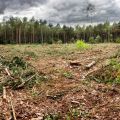Domesticating plants impacts their microbiome, study finds
16 January 2024
New research led by the University of Oxford indicates that human domestication of crops can alter the communities of microorganisms that are associated with plants. Intriguingly, independent domestication events were found to have similar impacts on the plant microbiome. The results have been published today in Current Biology.
Lead researcher Dr Riccardo Soldan (Department of Biology, University of Oxford) said: 'Our study provides evidence that regardless of where and how domestication took place, domesticated plants have microbial communities that distinguish them from their wild counterparts. This knowledge is important because if we know that a certain domesticated crop species consistently associates with specific microbes, one day we might be able to engineer these communities to deliver positive effects to the host plant.'
As microorganisms can have numerous beneficial effects on host plants such as enhancing growth, stress tolerance, and drought or disease resistance, these findings could ultimately help inform microbe-based approaches to improve crop yields and food security. For instance, previous work by the research team suggests that domestication may have reduced the ability of crop plants to recruit microorganisms that enhance disease resistance.
In the new study, the researchers analysed the microbial communities associated with two crop species that are known to have been domesticated independently multiple times in Mesoamerica and South America: Phaseolus vulgaris (common bean) and Phaseolus lunatus (lima bean). This meant they had a series of replicates for an event that lasted thousands of years.
As the researchers wanted to understand whether any changes in the microbiome were linked to plant traits that were subject to selection by humans during domestication, they focused on microbes associated with seeds. In seed crops, such as beans, seeds have undergone significant changes during domestication. For example, domesticated bean seeds are significantly larger compared with their wild relatives and have different mineral contents (linked to improved seed quality and cooking properties).
Using statistical and machine learning approaches, the researchers found significant differences in the composition of the microbial communities associated with beans from the wild and domesticated plants.
Furthermore, these changes in microbiome abundance and composition correlated with changes in seed mineral content across multiple domestication events. In particular, reduced calcium concentrations in domesticated P. vulgaris seeds, which may have been selected for as a consequence of selection for improved cooking properties, showed a notable correlation with changes in microbiome composition.
The principal investigator, Professor Gail Preston (Department of Biology, University of Oxford) commented: 'Our results provide evidence that the similarities in the microbial communities of independently domesticated plants can be partially explained by the fact that domesticated plants have closely matched plant traits. In this case, independent domestication processes selecting for bigger and better seeds in two different regions of the Americas shaped the seed microbiome in similar ways. Understanding the factors that shape microbial communities in wild and domesticated plants could open up exciting opportunities to modify the composition of domesticated crop microbiomes to increase resilience and improve productivity.'
In future work, the research team intend to investigate the effect of domestication on other plant traits and for a wider range of crop species. A key question is whether there are beneficial traits present in wild species which act to recruit a diverse and health-promoting microbiome that could be reintroduced into domesticated crops.
Notes to editors
Interviews with Professor Gail Preston are available on request. Media contact: Professor Gail Preston [email protected]
The paper ‘Consistent effects of independent domestication events on the plant microbiota’ will be published in Current Biology. It will be available online when the embargo lifts at https://doi.org/10.1016/j.cub.2023.12.056
About the University of Oxford
Oxford University has been placed number 1 in the Times Higher Education World University Rankings for the eighth year running, and number 3 in the QS World Rankings 2024. At the heart of this success are the twin-pillars of our ground-breaking research and innovation and our distinctive educational offer.
Oxford is world-famous for research and teaching excellence and home to some of the most talented people from across the globe. Our work helps the lives of millions, solving real-world problems through a huge network of partnerships and collaborations. The breadth and interdisciplinary nature of our research alongside our personalised approach to teaching sparks imaginative and inventive insights and solutions.
Through its research commercialisation arm, Oxford University Innovation, Oxford is the highest university patent filer in the UK and is ranked first in the UK for university spinouts, having created more than 300 new companies since 1988. Over a third of these companies have been created in the past five years. The university is a catalyst for prosperity in Oxfordshire and the United Kingdom, contributing £15.7 billion to the UK economy in 2018/19, and supports more than 28,000 full time jobs.
The Department of Biology is a University of Oxford department within the Maths, Physical, and Life Sciences Division. It utilises academic strength in a broad range of bioscience disciplines to tackle global challenges such as food security, biodiversity loss, climate change and global pandemics. It also helps to train and equip the biologists of the future through holistic undergraduate and graduate courses. For more information visit www.biology.ox.ac.uk
 Dr Ashwin Jainarayanan selected for 2024 Schmidt Science Fellow program
Dr Ashwin Jainarayanan selected for 2024 Schmidt Science Fellow program
 New study to improve vaccines and therapeutics development
New study to improve vaccines and therapeutics development
 Nature degradation could cause a 12% loss to UK GDP
Nature degradation could cause a 12% loss to UK GDP
 Alok Sharma to join the Oxford Martin School as a Visiting Fellow
Alok Sharma to join the Oxford Martin School as a Visiting Fellow
 Landmark study definitively shows that conservation actions are effective at halting and reversing biodiversity loss
Landmark study definitively shows that conservation actions are effective at halting and reversing biodiversity loss